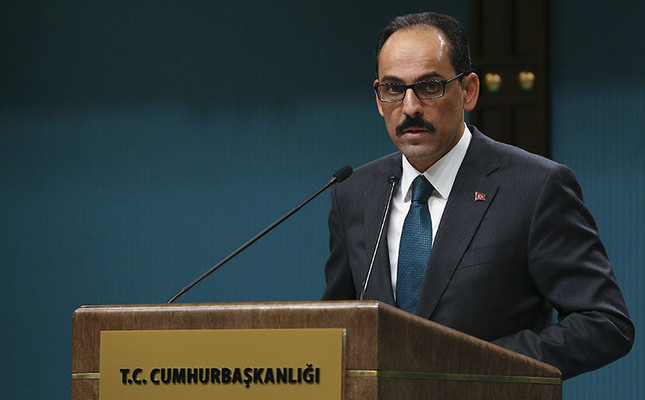LATEST
Turkish and Russian personnel are deploying in opposition-held Idlib Province in northwest Syria, according to a spokesman for Turkish President Recep Tayyip Erdoğan.
Ibrahim Kalin said four de-escalation zones, including one covering Idlib and parts of neighboring province, would be discussed further in the next conference in the Kazakh capital Astana in early July.
The zones were proposed by Russia, Turkey, and Iran in early May. They have reduced — but not eliminated — pro-Assad attacks in the northwest, while fighting and bombardment continues in other parts of Syria such as Daraa Province in the south and the Damascus suburbs.
“We will probably be most prominent in the Idlib region with the Russians; mostly Russia and Iran around Damascus, and a mechanism involving the Americans and Jordan in the south in the Daraa region is being worked on,” Kalin said.
He added, “Russians have a proposal: Maybe the Kyrgyz or Kazakhs would deploy a number of troops. They could also be involved in this task force.”
The Syrian opposition and rebels rejected the zones when they were announced, saying that they did not meet requirements for an end to sieges and bombing, and the release of detainees and that Iran could not be accepted as a guarantor.
The opposition did not respond on Thursday, but a local source said flatly, “Idlib folks won’t accept any foreign forces.”
7-Member US Team to Stabilize Syria
The US is sending a civilian team into Syria to try to bring stability to areas taken from the Islamic State.
It has seven members.
Some of the State Department officials and security personnel have arrived in Syria. They will organize efforts to clear ISIS roadside bombs and to restore electricity and access to clean water. They will not be involved in any other reconstruction efforts.
Our efforts in post-ISIS areas will be strictly focused on stabilization and thus meeting the immediate needs of civilians in order to enable them to return home and to prevent the return of ISIS. The efforts are limited to the provision of humanitarian assistance, clearing explosive remnants of war, and the restoration of essential services.
That is a narrower remit than that suggested by the chairman of the Joint Chiefs of Staff, General Joseph Dunford, when he promoted “an ongoing effort, led by the State Department, to put together a governance body so that as soon as Raqqa is seized, there is effective local governance”.
Defense Secretary Jim Mattis, in testimony last week before Congress, said the administration did not yet have “a fully fleshed out” strategy for maintaining stability in Syria and Iraq after the Islamic State is defeated.
Testifying before Congress last week, Defense Secretary Jim Mattis admitted the administration does not yet have “a fully fleshed out” strategy for maintaining stability in Syria and Iraq after the defeat of ISIS.
Faction Attacks, Seizes Police Headquarters Amid Rebel In-Fighting Near Damascus
The Failaq al-Rahman faction has seized police headquarters in the East Ghouta area near Damascus, amid ongoing rebel in-fighting.
Failaq al-Rahman’s clashes with Jaish al-Islam, the largest faction in the area, has hindered movement of humanitarian aid, medical aid and commercial traffic, and they are now threatening the East Ghouta Free Police.
The police suspended operations in territory controlled by Failaq al-Rahman after its headquarters in the Central Section of East Ghouta were attacked “on more than five occasions”, a spokesman said.
He added that the transportation office had now been seized: “The officers in the police station were let go, but all of the equipment — and the building — is still under Failaq a-Rahman’s control.”
A security guard was wounded when a Failaq al-Rahman fighter cut his name into the officer’s back, and the deputy chief of police was detained and beaten.
The spokesman said Failaq al-Rahman had declared a military police force, but “it’s chaos, and things will continue like this so long as Failaq prohibits the police and the judiciary from doing their jobs….With nobody to hold Failaq accountable, they will turn into shabiha [armed thugs, a name often applied to pro-Assad paramilitary groups].”
Failaq al-Rahman spokesman Wael Alwan responded, “I have no details on this matter. I don’t have the time to look into internal matters.”
Failaq al-Rahman have fought with Jaish al-Islam since spring 2016, weakening rebel defenses as pro-Assad forces took most of East Ghouta.

